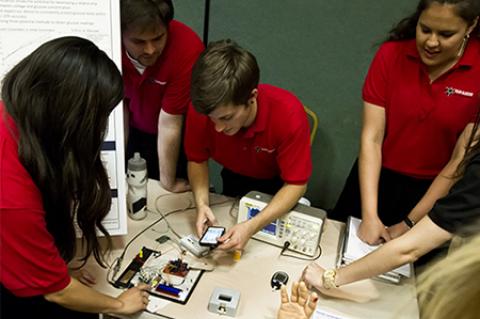Senior Engineering Design Project Gets Attention of Texas Instruments Visionaries

"I know our team deserves this opportunity, but I never imagined that we would be selected as one of the top 10 teams in the United States and Canada," said team leader Ashley Anhalt, a systems and industrial engineering graduate who will begin an industrial engineering PhD program at the University of Pittsburgh in the fall.
Anhalt plus one electrical and computer engineering major, one electrical-engineer-to-be, and three biomedical engineering seniors found themselves way outside their comfort zone with the glucometer design, but by the time they presented their yearlong project to judges at Engineering Design Day last April, they knew what it took to produce a good prototype.
"We made some really big strides in our understanding of glucose testing and biochemical sensors, and our project was well documented," said Daniel Sweeney, a biomedical engineering alumnus who will start graduate school in the fall at Virginia Tech.
The 10 finalists were chosen for the TI competition from among 125 applicants. They will present their projects to judges during the three-day Engibous Summit, named after the company’s former chairman and CEO, Thomas Engibous. The winning team takes home $10,000; second place $7,500, and third place $5,000. A "People’s Choice" award carries a $1,000 prize.
"Texas Instruments sponsors the Engibous Prize competition as a way to inspire engineering students and foster tomorrow’s innovators," said Art George, senior vice president and general manager of TI’s Analog Engineering Organization. "I’m impressed by the spirit of ingenuity the team demonstrated. It gives a great view into the exciting ways innovators like these can impact our world in the future."
Team Glucose's members certainly understand the importance of their work and its potential to make a difference in the lives of people who have diabetes. People with diabetes are unable to process glucose properly, resulting in high blood sugars. Over time, high blood sugar levels can cause problems -- sometimes life-threatening -- with kidneys, nerves, feet, eyes, and the heart. About 26 million children and adults in the United States alone have diabetes. Glucometers help people with diabetes monitor and manage their blood glucose levels.
"Diabetes is a condition that often goes undetected and can have many severe complications," said Pooja Rajguru, a biomedical engineering graduate whose grandfather struggled with diabetes.
Rajguru has been involved in diabetes research since high school and now works as a research associate at the UA Southern Arizona Limb Salvage Alliance, a research and clinical collaborative dedicated to preventing foot problems and amputations in people with diabetes.
Said Melvin Barney, an electrical and computer engineering senior scheduled to graduate in December, “We designed a glucometer that is much more accurate than other glucometers on the market, and it has the ability to transmit the glucose readings to an iPhone."
Team Glucose already has earned a few awards for their glucometer. Each year as part of the UA Interdisciplinary Engineering Design Program, more than 300 engineering seniors from various engineering disciplines display their club-, faculty-, and industry-sponsored projects at Engineering Design Day, with teams competing for prizes in several categories. Team Glucose took home prizes for Most Innovative Systems Integration and Best Team Leadership. Team members also won first and second prizes in the Fish Out of Water category.
"So much of the project revolved around electronics design and implementation. We all just tried not to be intimidated by what lay before us and jumped in when something needed to be done," said Sweeney. "After we figured out what the signal output of the test strip should be, the biological part of the project was more or less finished."

